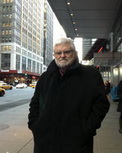 Chris
McDonnell, UK
Chris
McDonnell, UKchristymac733@gmail.com
 Chris
McDonnell, UK
Chris
McDonnell, UK
christymac733@gmail.com
Previous articles by Chris Comments welcome here
October
11, 2017
Dividing
the Seasons

We have reached mid October, living our way through
the Season that the Americans call The Fall, for obvious reasons. Taking a
cup of coffee the other morning, at the back end of September, I wrote
these few lines.
Until Day start week end Autumn Leaves fall damp ground rain Shortening days lengthening nights wind Until stripped trees, bend their bared thin fingers before Winter storms, beckoning another year-end dream. There is something emotive about the
'back-end', as farmers often describe the days from late August through to
late September. The days of warmth, sunshine and clear, blue skies seem
long gone. It is the time for the outdoor coat, as the wind and rain of
Autumn become more prevalent. It is a seasonal change that is often used
as model for our own life change, as we move from one stage to another. No-where has this been more graphically
used than in the words of John Henry Newman, take from his Letters
and Diaries So we use the metaphor of seasonal change
for our own inevitable aging, our transition from childhood, through the
teenage years, the time of marriage and the arrival of our own children,
reaching forward to our old age and a gentler pace of living. None of the
boundaries are absolute, none clearly defined by a date. We make our
journey with a blurring of ages and a change of circumstance, sometimes
smoothly and cared for, at other times with difficulty and frustration.
But pass through them we must. As we approach November and a time of
memory, the words of Lawrence Binyon will again be quoted. "They shall grow not old, as we that
are left grow old: With age comes the recollection of
memories, the thinking back to where we have been, friendships, the tears
and laughter we have experienced. For some however that is not possible,
their loss of memory has deprived them of recall and they live in the
present, needing our care, concern and love. It is sometimes hard for younger people to
appreciate passing years; having no immediate understanding of their
parents social experience they depend on the stories we tell them to get
somewhere near the reality of bygone years. The world before modern
technology to them seems empty and unreal. When my own son was six years
old, he enquired of me one Sunday at mass if "they
had candles in ancient times when you were young" We live where we are, passing our days in
the society our parents helped create and which we, in our own way, now
shape and form. It is a one way street, with a clear white arrow painted
on the ground indicating a forward direction. The adage "if I were going there, I
wouldn't start from here" is quite useless. However much we feel
uncomfortable with our lot, there is no going back. We might learn from
experience, and hopefully we do, but the direction is firmly determined. Reflecting on our Christian life within the
Church, it is as it is. Those who have walked their pilgrim path before us
did so to the best of their ability, in times and social conditions very
different to our own. There is no doubt that they like us struggled to be
Christ-like in times of change, often taking the consequences for the
courage of their actions. We are no different. We cannot time-travel to
find the imagined comfort of what used to be. So the struggles that Pope Francis
experiences in his continuing implementation of the wishes of the Council
are real and valuable. John's Council was heard, its documents published,
its decrees promulgated. It is our responsibility to see them through. The
Second Vatican Council decided that at least parts of the liturgy should
be in the language of the people. Because English is widely used
throughout the world, bishops from English-speaking countries created one
translation group, the International Commission on English in the Liturgy
(ICEL), which gathered translators, poets, biblical scholars, and others
to produce the English texts of the Mass and other sacraments. What they
produced in 1998 was rejected. It is time to pick up the pieces. END
"...… after a most glorious Summer, there was a week of pouring
rain, and then it was fine again and the sky as radiant as the week
before. But the season had changed, the ground had become thoroughly
chilled, and never recovered itself. Autumn had unequivocally set in, and
the week of wet divided the two seasons, as by a river. And so I think I
have now passed into my Autumn"
Age shall not weary them, nor the years condemn.
At the going down of the sun and in the morning
We will remember them."
---------------